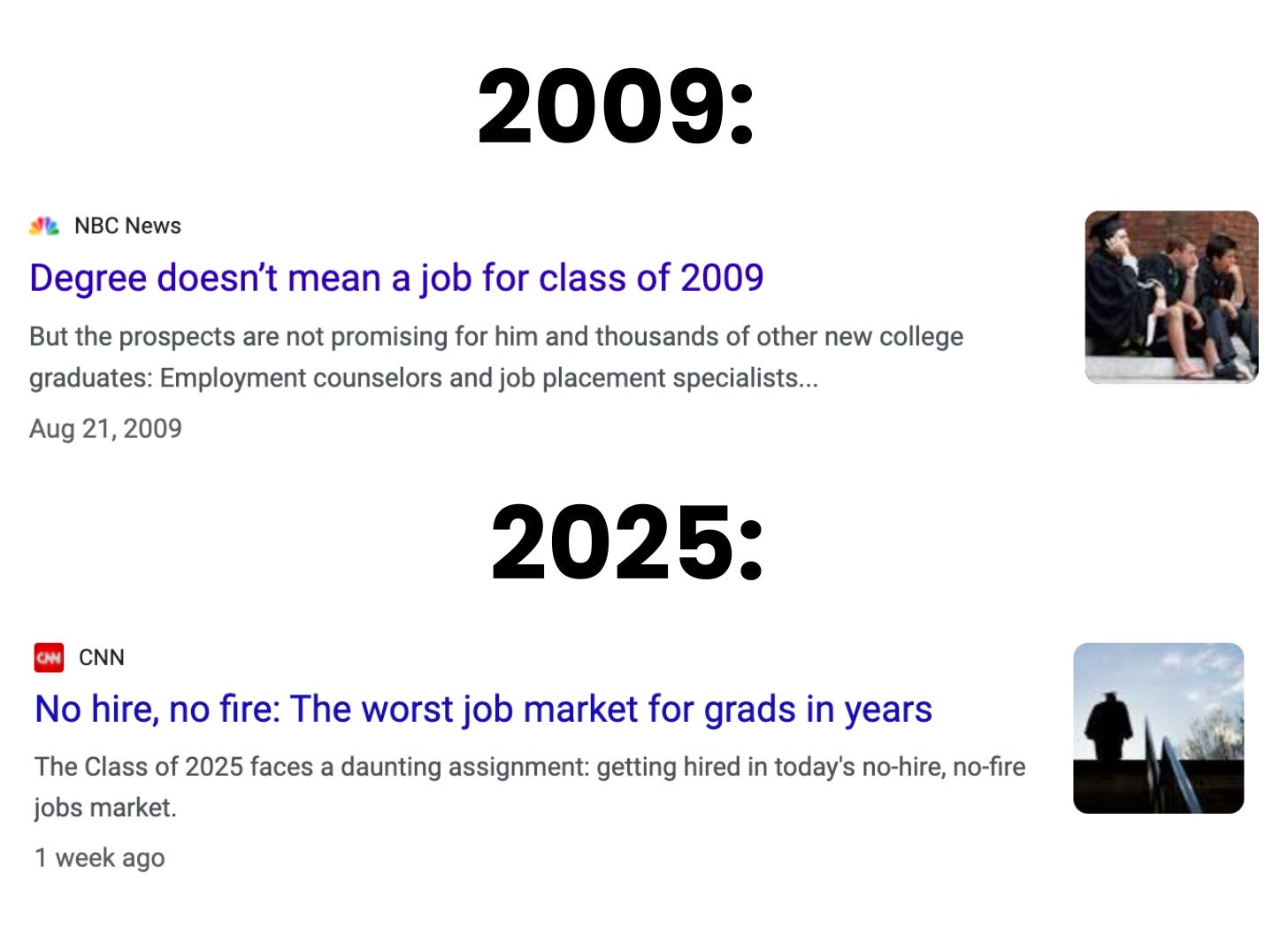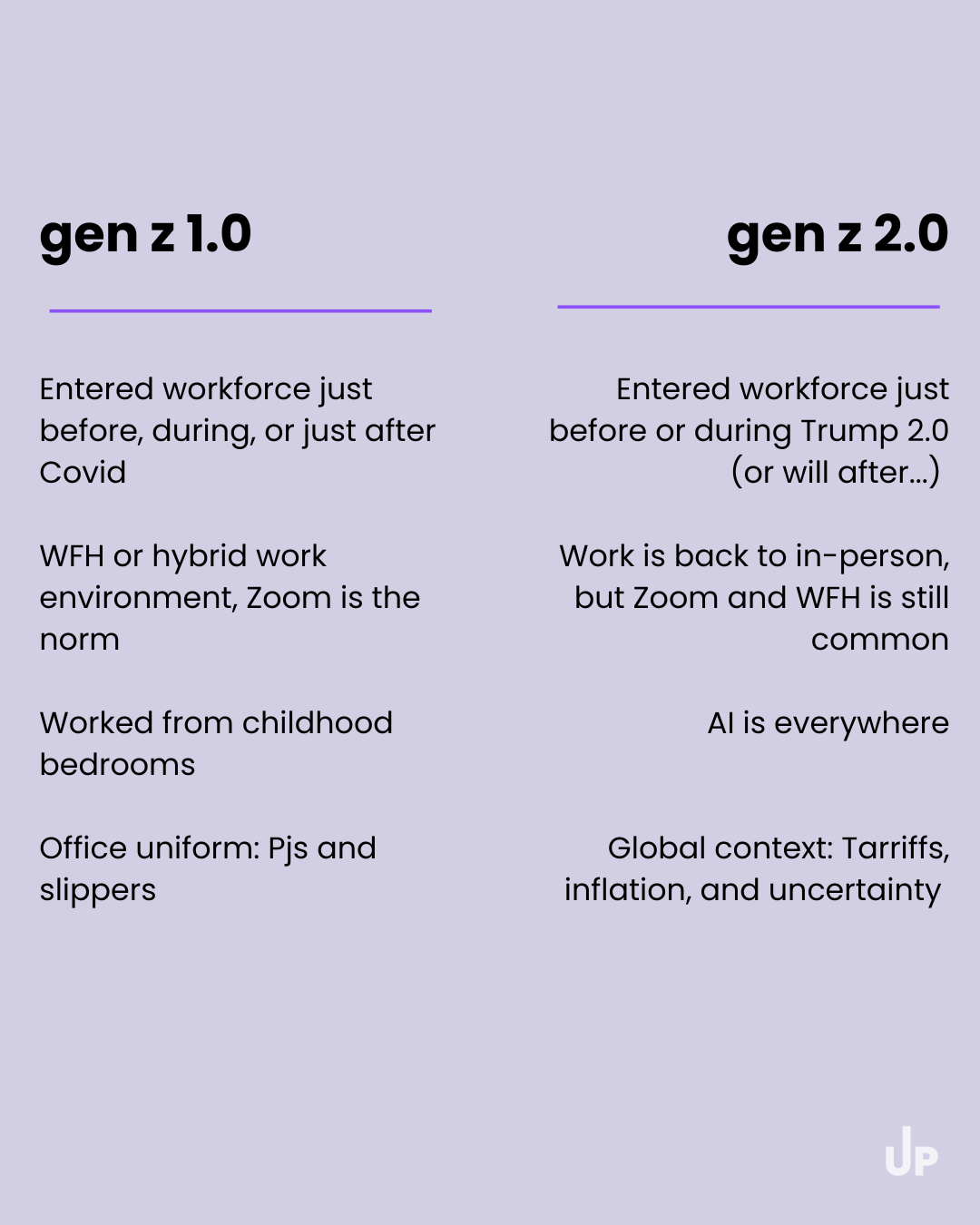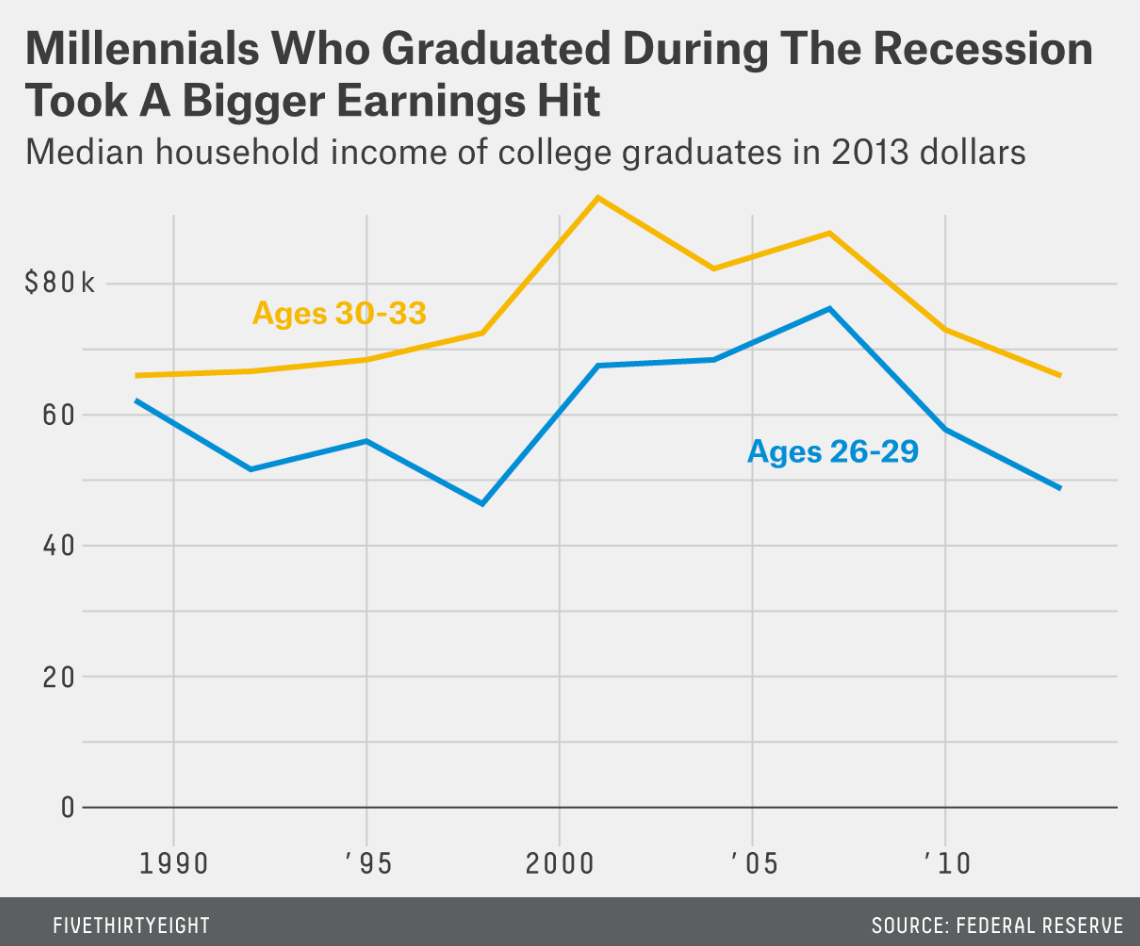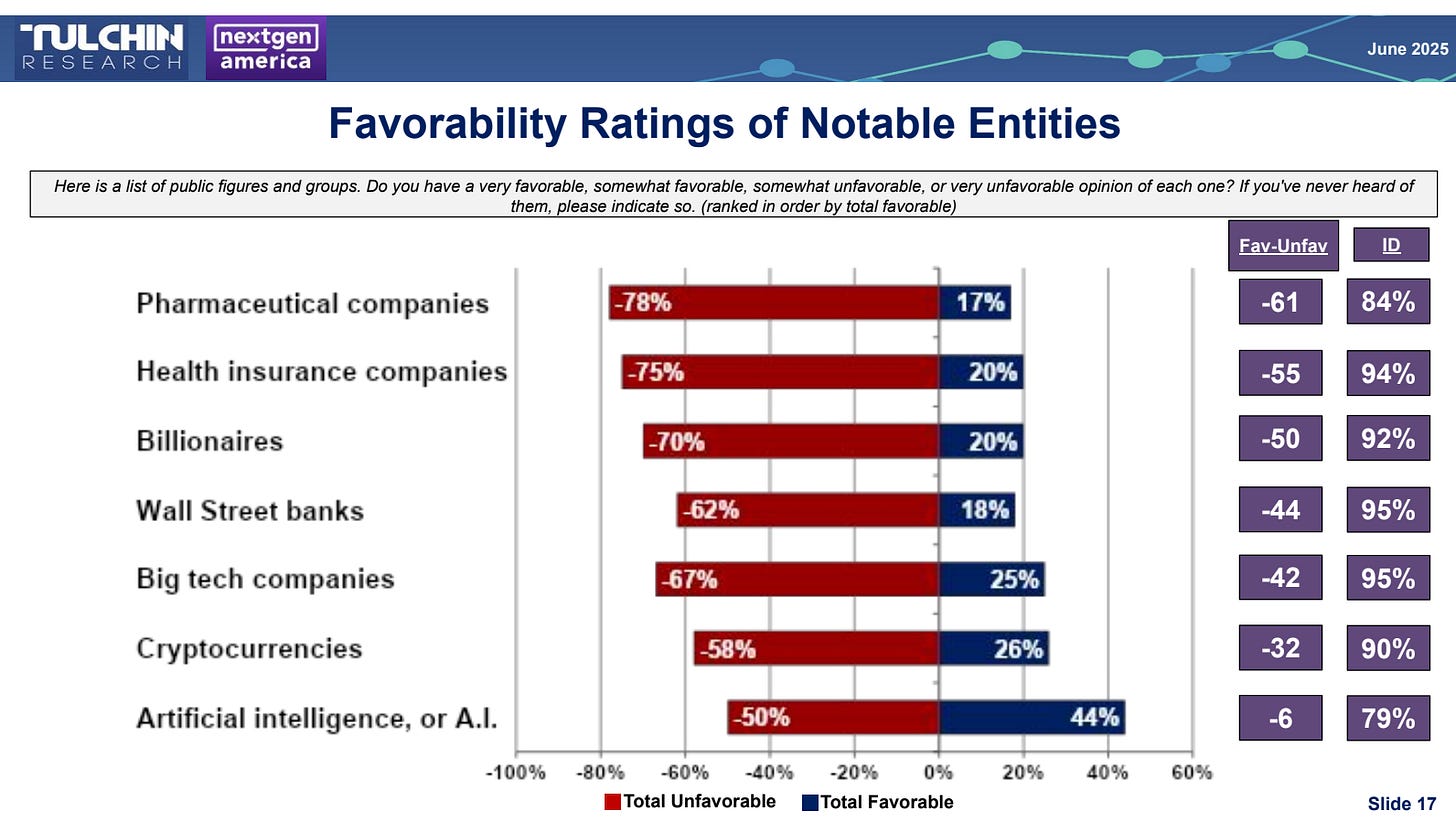Millennial Memo to Gen Z
Exclusive: New poll from NextGen America shows economic anxiety is politically motivating.
Feedback from recent college graduates featured in my Class of 2025 report earlier this week sounds eerily reminiscent to millennials who graduated in 2009 or 2010 – after the start of the Great Recession.
It won’t shock many of my millennial readers that grads from that era have some thoughts they’d like to share with their Gen Z counterparts.
One millennial’s advice to Gen Z:
“Create a spreadsheet of your finances. Take any job you can. Don’t take any sh*t from bosses.”
“This is my fifth economic downturn in my lifetime. We know how to handle it. We got you,” they told me.
Other millennials have gone viral online for sharing their tricks and tidbits…
Millennials had previously been dubbed the most financially worst off generation – poorer than their parents, facing unprecedented student debt, and less likely to own a home than prior generations.
Has that all compounded for Gen Z? The oldest Gen Zers in Gen Z 1.0 were the ones who graduated college just before, during, or just after the pandemic. We faced our fair share of trauma and a bizarre entry to the real world and workforce – working out of our childhood bedrooms in our pajamas.
But now, some of the oldest in Gen Z 2.0 are facing a world with new tariffs, massive global uncertainty, the rise of AI, and the possible disappearance of jobs they went to school to secure.
For all the discourse about generational trauma, there are a few takeaways we’ve learned from recession grads that offer insight into how the class of 2025 may fare down the line. At risk of sounding pessimistic, it’s not looking great.
According to a FiveThirtyEight analysis of Federal Reserve data from 2015, millennials started their careers earning less money than the generation before them. The median household income declined, with “recession” millennials hit the hardest because, having graduated into economic strife, they never got an opportunity to kickstart their life in the way grads a few years older had.
Check out this 2015 chart of Federal Reserve data from FiveThirtyEight:
That could be true of 2025 grads as well.
Top it off with inflation, the rising cost of living, and a job market disrupted by the rise of AI. Long term wealth generation for the oldest cusp of Gen Z 2.0 will be an uphill battle.
Many of the 2025 grads I spoke to are feeling depleted and disillusioned, that’s for sure. But I also hear a resolve to lean in, to use their early AI experience as an advantage, and to fix the political and social failures they believed created this mess in the first place.
Across the board, there’s a strong urge to rewrite the rules around the systems they believe have failed them.
Along those lines…
NextGen survey confirms: Fueled by economic anxiety, young voters eye disruption
New data from progressive youth vote focused organization NextGen America shared exclusively with The Up and Up shows that economic anxiety is a politically motivating factor for young Americans under 30.
The survey, commissioned by NextGen and conducted by Tulchin Research, paints a clear picture that tracks what I’ve been saying for a while: today’s youngest voters are worried about what comes next, sick of traditional politicians and politics, rooted in issues more so than any party ideology, and looking for heterodox leaders who aren’t afraid to challenge the status quo.
The national poll surveyed 1,300 voters ages 18-29, with an oversample in Virginia – where there’s a gubernatorial race this fall. Unlike other national polls that include a single cross tab for young voters, this poll solely surveyed the demo.
Here are some of the key takeaways from, and my analysis of, the survey:
Economic issues are top of mind. According to a memo on NextGen’s poll, “87% are motivated by inflation and the cost of living.”
Populist messaging resonates. The poll found deep-seated animosity toward “corporate power and billionaire control.” And despite a recent boom in new tech, there’s even skepticism toward crypto and AI.
It’s not just TikTok. Despite the trope that all young people get their news on TikTok, this poll found that YouTube is actually the top media platform for young people, followed by Instagram and Spotify. And yes – as one of the top places young people get their podcasts, Spotify is a media platform.
Thanks to President Donald Trump’s economic policies, some young voters are drifting back toward Democrats. On the whole, young voters “oppose proposals to cut medicare, social security, and medical research funding,” NextGen shared in their memo. But they warn that while these young voters are “moveable” and “winnable” for Dems, they’re also “loseable.”
Issue > party. Young people aren’t loyal to entrenched political establishments or orthodox beliefs. They hold nuanced views on a range of issues and may like some policies that are more aligned with Republicans, while loving others prioritized by Democrats. Both parties are viewed unfavorably by young Americans. The Dems have a net -9 favorability, while Republicans have a net -27 favorability, the poll found.
Authenticity > cringe. It seems obvious, but young voters don’t want a candidate who is trying too hard to be cool. They want politicians to be themselves, even if that means being old, goofy, or painfully blunt.
“In 2009 and 2010, young people graduated into a recession, feeling anxious about when they would find a job. The class of 2025 is facing an even more unsettling reality — they are wondering if there will be any real opportunities available at all. This generation has come of age during a time of overlapping crises, where the cost of essentials like housing and healthcare seems prohibitively high. They are skeptical of institutions — not because they lack interest, but because they have witnessed those institutions fail to advocate for them. Nevertheless, they hold onto hope — not only out of necessity but also because they desire something worth believing in: the chance to build a stable life,” NextGen’s Director of Communications Emily Slatkow tells me.
“Young people are watching closely—and they’re unimpressed by what they see. Trump’s promises on the economy haven’t materialized, and concerns about budget cuts to vital programs like Medicare have shaken their confidence. His approval is dropping among young voters, who are tuned in through YouTube, TikTok, and podcasts that unpack these issues daily. Even figures like Elon Musk, who is widely disliked by young people, have fueled skepticism about the viability of Trump’s economic plans. While we’re seeing a shift back toward Democrats, this momentum can’t be taken for granted—there’s still significant work to do to earn young people’s trust and secure their vote,” she said.
Noteworthy Reads
Why is Gen Z getting more religious? We asked them., Jonquilyn Hill for Vox
Gen Z is embracing a digital detox and the ‘Martha Stewart summer,’ Eve Upton-Clark for Fast Company
Gen Z Doesn't Seem To Care About Protesting Against Trump, Marni Rose McFall for Newsweek







I suspect that in every successive generation, people in their 20s generally dislike the two-party system and feel little party loyalty or identity. That was certainly true of my peers and me (Gen X). I have become aligned with one of the parties not because I think it's great (I find it frustrating tbh), but because the other party has been attacking things I most care about. I wouldn't be surprised if that "lesser of two evils" approach is true of many people.
As for economics, I believe that since the Baby Boomers, every generation has had a higher cost-of-living and a lesser share of wealth than the one before it. Certainly the cost of a college education, house, and car were more for me than for my parents. My Baby Boom parents were able to buy a 3-bedroom house in a good suburb on one entry-level salary while they were still in their early 20s and had 2 young kids. (They had no inheritance or other pre-existing wealth either.) That wasn't possible for me, and I think it has only gotten more and more distant for the generations after me--I think it's completely unimaginable now--but I'd love to see the data. With each generation having more of an uphill climb than the one before it, something is seriously wrong.